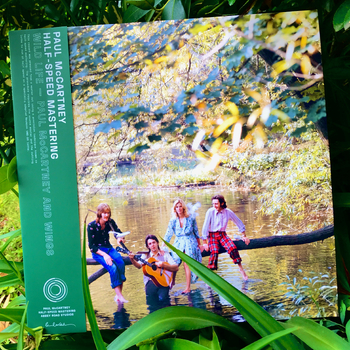WINGS TAKE OFF
Author: Bruce Jenkins Date Posted:15 December 2023

What with one thing and another, Sir Paul McCartney has been much in the news recently. One thing was the release of single "Now And Then", the much anticipated "last Beatles recording". That slight yet pleasant song initiated an extraordinary bout of pop-culture breathlessness around the world that, in Australia, was followed by another thing: a series of live concerts by Sir Paul. These were ecstatically received. And why not? Playing big chunks from the Beatles catalogue plus highlights from his extensive solo career, McCartney amply demonstrated why he is considered a living treasure.
One album that did not figure in his three hour set list was the odd but enjoyable 1971 album Wings Wild Life.
Although devastated by the breakup of the Beatles, McCartney, with loving support from his wife Linda, kept creating. In April 1970 he led off with McCartney, pretty much a one-man-band record. In May 1971 Ram was released, credited to Paul and Linda McCartney. In December 1971 a third post-Beatles LP emerged, this time under the moniker Wings.
Wings was Paul and Linda with drummer Denny Seiwell, with whom they had worked on Ram, plus Denny Laine, formerly of the Moody Blues. Guitarist Laine, who died in early December 2023, had met McCartney back in the Beatles heyday when they struck up a friendship while on tour. He became a key member of Wings in the years after Wild Life including a very lucrative co-write with Paul on the massive hit "Mull Of Kintyre."
People don’t talk a lot about Wild Life, but it is a genial record that shows a band cautiously feeling its way towards a new future. The relaxed musical atmosphere is reflected in the cover photo; a love of nature and a leisurely approach. Having said that, the LP starts off at quite a clip, with "Mumbo". Paul is rockin’ out, his voice almost unrecognisable. Those famous vocal chords are disguised on the second track too, the dumb but delightful "Bip Bop." This fun track is entirely devoid of substance but has a charming silliness certain to make you smile. The words include the oft-repeated couplet:
Bip bop bip bop bop / Bip bop bip bop bam
Some wag at lyrics site genius.com has annotated this timeless poetry with the following explanation: "Heavily indicative of some kind of bip (and/or bop)".
After a reggae-tinged cover of "Love Is Strange" the album’s title track shows the first real glimpse of serious McCartney song-writing, not to mention his emerging interest in animal rights and the environment. It’s kind of there in the album title, isn’t it?
"Some People Never Know" opens side two tunefully. With the addition of a killer McCartney middle eight, this could have been a classic. As it is, it’s representative of the whole side—melodic and pleasant.
For Beatle/McCartney fans the highlight has to be the last song, "Dear Friend". Widely considered a "hand of peace" extended to John Lennon (after the latter’s scathing "How Do You Sleep") it carries more emotional heft than the entire rest of the record and closes the disc on a touching high.
In terms of sound quality, the half-speed master (released in 2022) is an improvement on previous re-issues and even on the original 1971 version. Bass has been lifted in the mix and is well defined. The guitars—both electric and acoustic—are clean and the sound stage is wide and clear.
Overall, this is a fine re-issue of a Paul McCartney album that has long polarised fans and attracted no shortage of hostility. Sure, it has padding and might have made a better mini-album, but there are plenty of enjoyable moments and a couple of standout songs. Just don’t expect Band On The Run*.
* Which, by the way, is due out in a new half-speed mastered version early 2024. Hooray!
© Bruce Jenkins—December 2023

